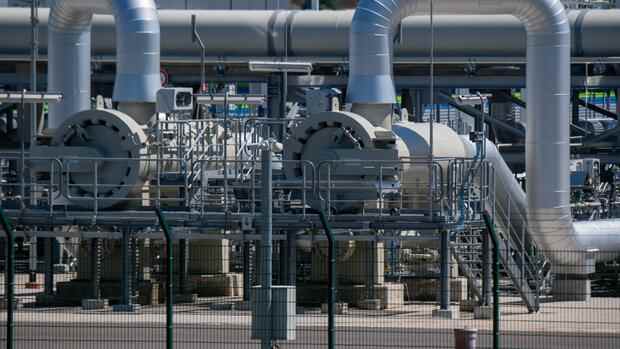The upcoming maintenance of the pipeline Nord Stream 1 puts the federal government under time pressure.
(Photo: dpa)
Berlin In view of the gas crisis and rising energy prices, there is growing concern in the cities that municipal utilities will run into serious difficulties – and that security of supply would be jeopardized. “The pressure on the public utilities is increasing every day,” said the general manager of the German Association of Cities, Helmut Dedy, the German Press Agency.
If the public utilities were to pass on the rising prices, many households would be overwhelmed by the costs. If they don’t pass it on, “then many municipal suppliers could slide into bankruptcy, and the supply of many households would no longer be secure”.
Dedy said, “Only the federal and state governments can solve this problem.” They must prevent municipal utilities from getting into serious trouble. “Otherwise the security of supply in Germany would be in danger.” It is predominantly the municipal utilities, from which many households obtain gas and electricity, water or heat. The pressure to act grows every day.
The federal government must immediately put the municipal suppliers under the protective shield for companies. He continued to demand that the affected municipal utilities quickly receive liquidity support through guarantees and loans. In his opinion, an insolvency moratorium must also be initiated in the short term in order to suspend the obligation to file for insolvency.
Top jobs of the day
Find the best jobs now and
be notified by email.
>>Read also: The federal government is discussing these relief measures
Transport companies, municipal hospitals, schools, baths and other public facilities would also feel the consequences of the energy crisis. Dedy also called for an honest debate: “We have to talk about what comforts we can do without and what remains necessary on site? It’s about street lighting and traffic light switching, hot water in public buildings, museums and sports halls, fans in schools or air conditioning systems.”
Bundesnetzagentur: Unequal gas distribution threatens
According to the President of the Federal Network Agency, an unequal gas supply in Germany would have far-reaching consequences. “The moment the pressure in the gas network in a region falls below a certain minimum, the fuse in hundreds of thousands of gas boilers would suddenly kick in,” said Klaus Müller to the newspapers of the Funke media group.
The public utilities could slip into insolvency if they do not pass on the energy costs.
(Photo: dpa)
“It would have to be manually activated again by trained specialists if gas were available in the region again.” No one could want such a scenario, “because it would take a very long time to restore the gas supply. So it will always be the aim of the Federal Network Agency, if necessary, to order reductions in industrial consumption so that this scenario does not occur.
According to Müller, the gas flows in Germany have so far been more or less evenly distributed. “That could change if we only received gas from Norway, the Netherlands or Belgium,” says Müller.
Therefore, the reservoirs are already being filled so that the south can also be adequately supplied. “For example, we are currently not only focusing on the largest German storage facility in Rehden in Lower Saxony, but also on the storage facility in Wolfersberg in Bavaria.”
Habeck warns of price explosion
According to Federal Economics Minister Robert Habeck (Greens), the feared stop to all Russian gas deliveries could result in a price explosion at some municipal utilities. Habeck and the President of the Federal Network Agency, Klaus Müller, fear a total failure of deliveries via the Baltic Sea pipeline Nord Stream 1.
Habeck said on Saturday at an event of the weekly newspaper “Die Zeit” that the Russian attack on Ukraine was a “quasi economic warfare conflict”. The Russian calculation is to “destroy the unity and solidarity of the country” through high prices in Germany. According to Habeck, it is still unclear whether Russia’s President Vladimir Putin will actually turn off the gas. “The question is: does he really do it?” It’s not out of the question.
With a view to suppliers such as Uniper, the largest German gas importer who got into trouble, the minister said: “The companies that now have a lot of Russian gas have a real problem.” Either the state supports them with tax money. “Or the companies are allowed to pass on the prices.” This is provided for in the Energy Security Act. Discussions about a probably necessary change in the law were under way in the coalition. A paragraph that would allow companies to pass on prices outside of the contract has not yet been activated. Because this is “a very, very sharp sword”.
“That would mean that for some public utilities, which would then have to deal with their customers, you would immediately have a price explosion.” The government is also working on other options “that may not drive the wedge so sharply into society”.
More: Many companies are at their breaking point because of energy prices
